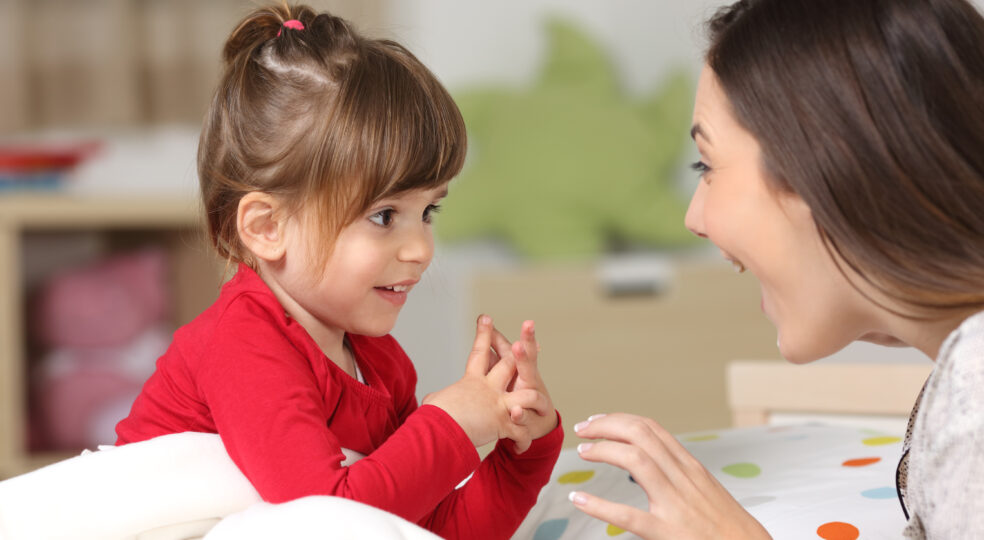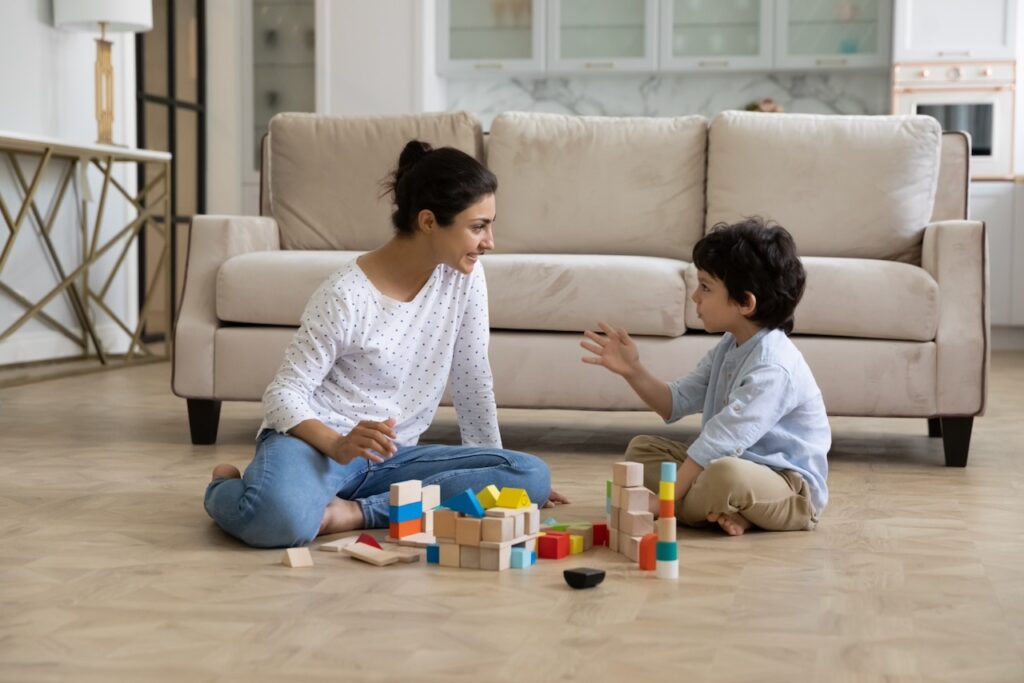
A child's language development is an exciting and complex process that proceeds at an individual pace. It is therefore not easy to determine when there are deviations and when action is required. Nevertheless, parents can do a lot to support language development.
A child's speech development begins in the womb. A child's hearing is already fully developed by the fifth month of pregnancy. Even if the amniotic fluid greatly muffles the surrounding sounds, the child can hear its mother's voice and recognize it after birth. It prefers the familiar voice to other voices, which can be clearly observed.
A child's language development takes place in different stages, which we would like to give you an overview of below:
The only way for the baby to communicate is to cry. After a short time, different causes can be identified from the crying. The mother recognizes, for example, whether the child is cold, tired or hungry. The baby is able to make eye contact and observes how the adults speak.
When you talk to your baby, you usually automatically use nursery language, which is characterized by a soft speech melody and short sentences. The child learns to understand that speech melodies can be used to express different emotions are expressed. This is where the basis for later language comprehension is laid.
The first babbling phase begins in the second month of life. The sounds are produced randomly through muscle movements, but the child is fascinated by its voice. Almost all children begin to coo at this age - regardless of their mother tongue. Cooing can also be observed in babies born deaf. Furthermore, the child begins to coo through conscious Smile to communicate.
The child learns to control their mouth, tongue and throat muscles more consciously. It mainly makes guttural sounds (rrr ...). When adults engage with him, the child tries to imitate the mouth movements.
It is even possible to have small dialogs with the baby. Try it out for yourself: If you talk to your child and take a break, your child will continue chatting in their own language to answer you.
The child deliberately tries to attract the attention of the caregiver by babbling and chattering. It can also laugh and gurgle. The reactions now have a concrete reference, e.g. your baby whoops with delight when you tickle it gently or blow on its tummy. Certain words that you use repeatedly will become more familiar to your child.
In the fifth month of life, the first individual differences in a child's language development become apparent. While some children continue to babble and talk happily, others become quieter. In this case, a surge in motor development can usually be observed at the same time. The child does not yet understand individual words, but can distinguish between angry, sad and happy voices.
The second babbling phase begins in the sixth month of life. The new sounds that the child now makes are increasingly similar to the sounds of the mother tongue. The child also begins to form its first syllables (e.g. mamama, dadada, deideidei etc.). Sometimes it seems as if your child is telling you stories in their own language.
Your child will form ever newer and more complex syllables. Double syllables are very common in this phase of a child's language development. The first understanding of words for simple and everyday objects, which are repeatedly used in the child's everyday life, develops. However, it still takes some time before the child speaks the first conscious word itself.
Around their first birthday, your child may well utter their first consciously spoken word! Popular first words are, of course, mommy and daddy, but also yes and no. If other words are added, it is completely normal that the child cannot yet pronounce some of them correctly (e.g. nane instead of banana, deto instead of car).

Your child will develop an ever-increasing vocabulary. It is perfectly normal for them to pronounce individual sounds incorrectly. The child uses one-word sentences. This means that a single word contains a more far-reaching statement. For example, your child says ball to express that they would like to play with the ball.
Around 80 % of boys and 90 % of girls can now speak at least three words, apart from mom and dad. At this stage, individual differences in a child's language development come to light again. For some, language development seems to stagnate for the time being, while others continue to babble away. By the 2nd birthday, the vocabulary grows to at least 50 words.
The child gradually begins to use two-word sentences. Language development seems to be exploding. You can observe that your child is learning new words every day. The first questioning age also begins. Your child asks for names and objects throughout the day (e.g. by pointing).
The child is now able to form simple sentences without making mistakes. Some children try their hand at their first subordinate clauses and use linking words ("if", "because", "as"). Even the first difficult sounds can be made without mistakes. The second and typical why-question age begins.
The child has acquired a large vocabulary that differs only slightly from the vocabulary of adults. It uses filler words and can talk about events in the Past and the future. The formation of subordinate clauses is becoming increasingly proficient.
On average, a child's language development is completed by the age of five years completed. In this final phase, the child finally succeeds in pronouncing the sibilants correctly. They can understand complex contexts, talk about their experiences and tell stories.
Some parents are concerned when they notice that children of the same age speak much more and better than their own child. Basically, a child's speech development is individual. It is therefore not so easy to judge when a developmental disorder might be present.
As a rough guideline, if your child is one and a half to two years old and does not yet speak one or two-word sentences and generally shows little interest in communicating, it makes sense to make an appointment with the pediatrician. But how can you help your child learn to speak? We have summarized the most important tips for you:

In some cases, delays in a child's speech development are due to hearing loss. If this is not recognized and treated in time, it can have a fatal effect on language acquisition, as studies by the LMU prove
If the hearing loss is severe, a cochlear implant may be an option to help the child. Studies show that language development can be positively influenced by this measure.
If your child is affected, you can do a lot to support the acquisition of spoken language. Put your Child and create a playful atmosphere, just as you would with a healthy child. Contact your pediatrician and seek speech therapy treatment.
Every child acquires language at their own pace. You can support this process by talking to your child, reading to them and singing to them. Do not put pressure on your child or yourself. However, if you notice that your child is still showing little or no interest in language at the age of two, you should contact your pediatrician.

